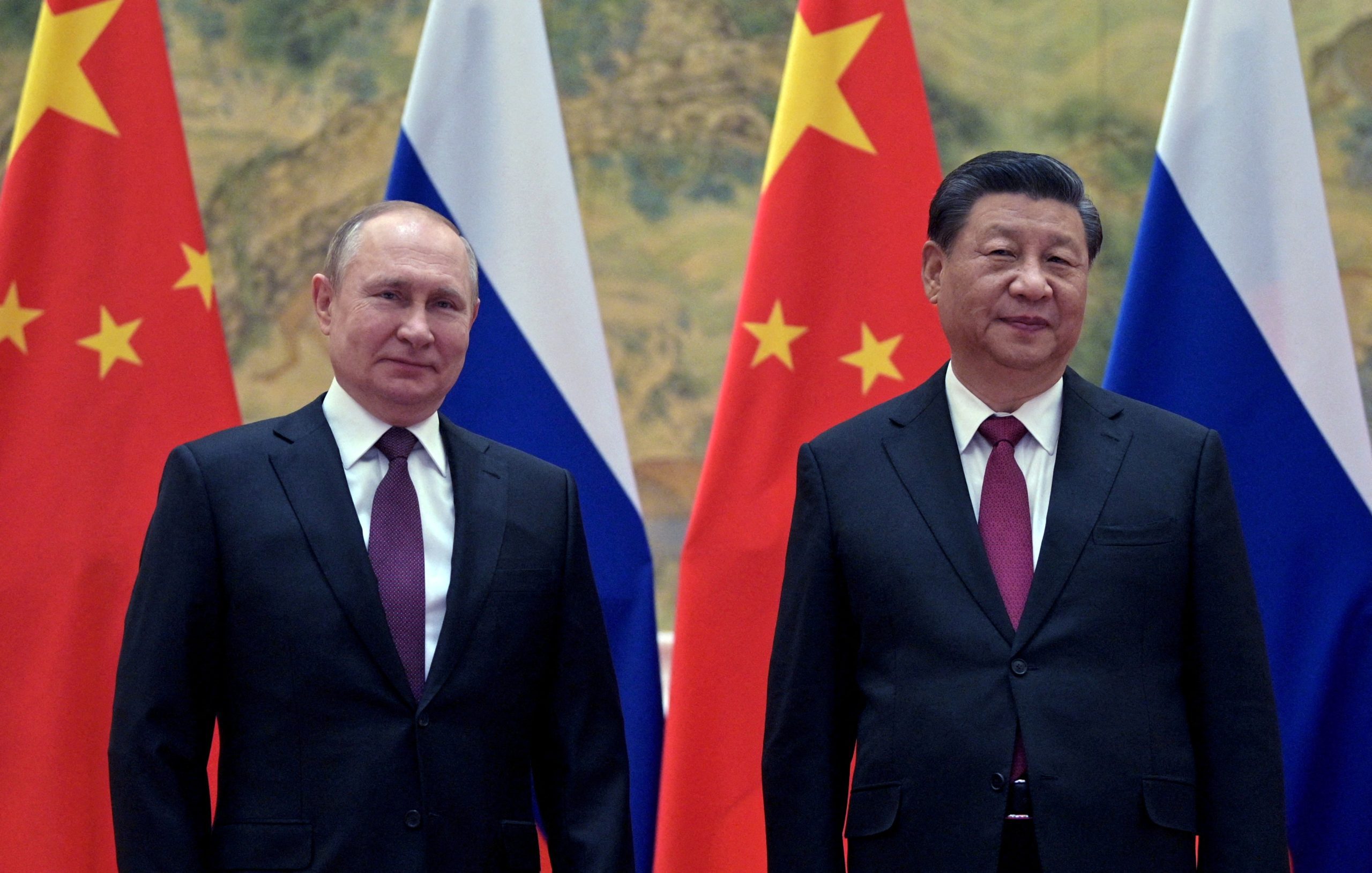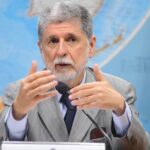
By Caio Bugiato, professor of political science and international relations at UFRRJ and the graduate program in international relations at UFABC.
The US-led Western offensive via NATO expansion to the borders of non-Washington-aligned countries does not just lash out at the Russians. The visit of the then Speaker of the United States House of Representatives, Nancy Pelosi, in 2022 to the island of Taiwan was seen as a provocation by Beijing, which considers the island a rebellious province. Recently, US President Joe Biden announced, at a naval base in California, alongside the British and Australian prime ministers, the acceleration of sending nuclear submarines to Australia. The shipment is part of the defense partnership (Aukus pact) between the three countries, under allegations of containing Chinese plans for naval dominance in the Indo-Pacific and the retake of Taiwan.
It is also worth mentioning the attempt to revive the anti-China alliance, created in 2007, the Quadrilateral Security Dialogue, or Quad, a forum formed by the United States, India, Japan and Australia. Among these and other measures of US foreign policy, tensions in the Pacific point to a process of ukrainization of Taiwan: given the troubled relations of the island with the rival US power, Washington’s plan is to transform it into a puppet of the West to destabilize and demolish the Chinese rise.
Amid the war in Ukraine, China has demonstrated a position of neutrality on the conflict, despite partnerships with Russia since before the war. However, one of the great points of agreement between the Putin government and the Xi Jinping government is the discomfort with the US global offensive, in several aspects. The Chinese closely follow the conflict in Ukraine between NATO and Russia. They are aware of the escalation of the war, with the resounding economic and military aid from the West to the Zelensky government, especially with the recent agreement to send war tanks. They even consider that the Russian defeat is the maintenance of the current world order, in which the autonomy of the States is harassed by US imperialism.
Well, Xi Jinping visited Moscow between March 20 and 22 at the invitation of Vladimir Putin’s government to discuss strategic cooperation between the two countries. China is the third largest military power in the world – and possessing nuclear weapons – behind the United States and Russia. It is important to remember that the Chinese State is not configured only as a contender for US supremacy, it proposes an alternative to capitalism: socialism with Chinese characteristics.
At the 19th National Congress of the Communist Party in 2017, the Chinese government announced a more preponderant position in international politics: the promotion of socialist modernization until 2035 and until 2049, the date of the hundred years of the Chinese Revolution, aims to celebrate the status of a country “powerful, prosperous, strong, democratic, culturally advanced, harmonious and beautiful”. This new rapprochement between the Russians and the Chinese was already a matter of concern for Westerners, who discussed it at recent NATO security conferences.
At the Sino-Russian meeting, there were understandings with the aim of expanding the economic partnership and strengthening military cooperation, in the face of US sanctions threats if China supplies Russia with weapons. In a common perspective of counterbalancing the United States and its Western allies, Xi Jinping and Vladimir Putin signed a total of 14 declarations, protocols, memorandums and agreements, in addition to delivering speeches in line with the documents. In general, they established commitments on bilateral cooperation, such as to increase trade, which grew 30% in 2022 and is around US$ 200 billion, of which two thirds were made in yuan and rubles, removing the hegemony of the dollar.

They also made commitments to expand agricultural cooperation to ensure food security, develop logistics and infrastructure, and increase cooperation in the exchange of energy, minerals, metals and chemicals, as well as cooperation in the areas of technology, information technology and artificial intelligence. One of the projects deals with a second gas pipeline from Russia to China, to be built in Siberia and operate through Mongolia, increasing exports of Russian natural gas. Likewise, the governments agreed on a long-term cooperation program in atomic energy. In addition, they committed to media cooperation to share information and produce documentaries about the countries. A protocol instituted a mechanism for regular presidential meetings.
From a military point of view, the summit agreed to develop military exchange and cooperation, increase mutual trust between their armed forces, and regularly conduct joint exercises and maritime and air patrols. According to Xi Jinping, China made a strategic choice in line with its own fundamental interests and prevailing trends in the world, indicating that the two states share a commitment to a multipolar world. Despite the military partnership, the governments opposed a politico-military type alliance and criticized the Aukus pact and NATO’s military expansion.
On the war in Ukraine, Vladimir Putin praised the peace proposal made by the Chinese last month and stressed that its elements can be considered as a basis for an agreement when the West and Kiev are ready. But he pointed out that Kiev is not in a position to discuss peace as its Western backers do not want any ceasefire in Ukraine, they want the destruction of Russia with this war.
Specifically, attention is drawn to the document that indicates a new multipolar era, the Joint Declaration of the People’s Republic of China and the Russian Federation on Deepening the Comprehensive Strategic Coordination Partnership for the New Era. An excerpt is worth reproducing:
“The two sides stressed that consolidating and deepening the China-Russia Global Strategic Partnership of coordination for a new era is a strategic choice made by both sides based on their respective national conditions, which is in line with the fundamental interests of the two countries. and its peoples, in line with the trend of development of the times, and is not subject to outside influence. The parties will: (i) guided by the consensus reached by the two heads of state, ensure that bilateral relations will always move in the right direction.
(ii) We must give each other firm support in safeguarding our respective fundamental interests, particularly in matters of sovereignty, territorial integrity, security and development. (iii) Uphold the principle of mutual benefit, continue to deepen and expand practical cooperation in the modernization process, achieve common development and prosperity, and benefit the Chinese and Russian peoples. (iv) Promote mutual understanding and friendship between the two peoples and continually consolidate the friendship between the two countries for generations on social bases and in public opinion. (v) Promote the multipolarization of the world, economic globalization and the democratization of international relations and promote the development of global governance in a fairer and more reasonable direction”.

“The two sides stressed that countries have different histories, cultures and national conditions, and each has the right to independently choose its development path. There is no “democracy” that is superior to others. Both sides oppose the imposition of national values on others, oppose the use of ideology to draw lines, oppose the hypocritical narrative of so-called “democracy versus authoritarianism”, and oppose the use of democracy and freedom as a pretext and political instrument to exert pressure on other countries and on politics”.
Clearly multipolarity is in opposition to US-led unipolarity. They express their dissatisfaction with the international order by talking about the democratization of international relations and global governance. They obviously understand that the United Nations needs reform, as do international institutions such as the World Bank, the IMF, the WTO and the WHO. They oppose the imposition of “freedom” and “democracy” by western imperialism.
As a result of the meeting, Xi Jinping invited President Vladimir Putin to visit Beijing in 2023, at the 3rd Belt and Road Forum for International Cooperation. Speaking to reporters, the Chinese president told the Russian that changes are happening now that haven’t happened in 100 years and both are moving those changes together.
Originally published on the website A Terra é Redonda
Join our WhatsApp group, clicking on this link
Join our Telegram channel, click this link
Source: https://www.diariodocentrodomundo.com.br/multipolarizacao-russia/

